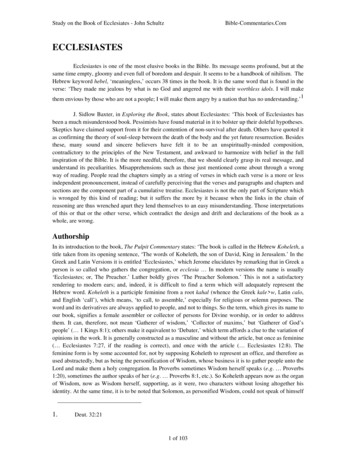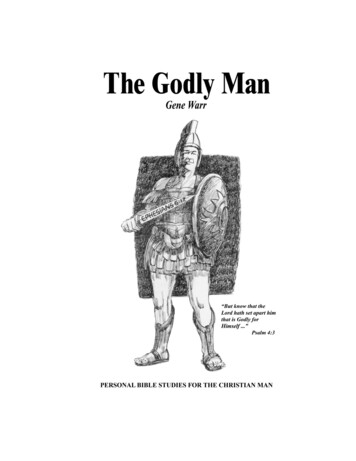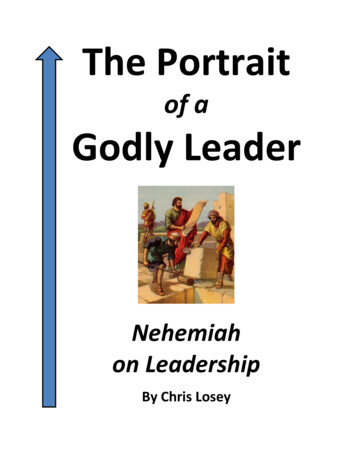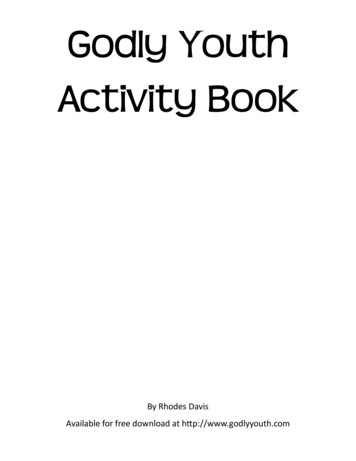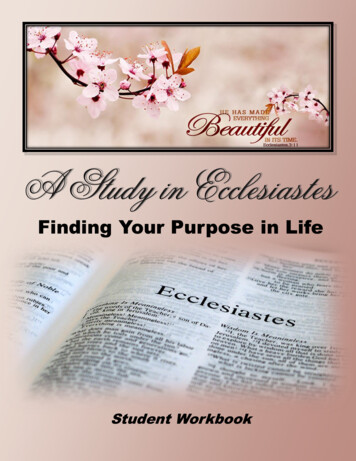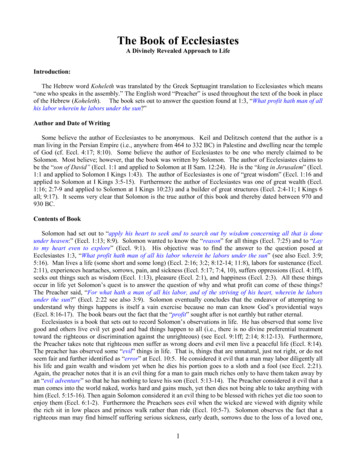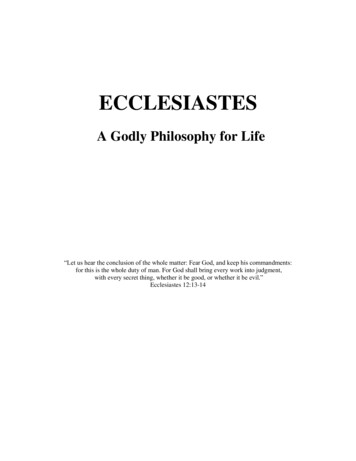
Transcription
ECCLESIASTESA Godly Philosophy for Life“Let us hear the conclusion of the whole matter: Fear God, and keep his commandments:for this is the whole duty of man. For God shall bring every work into judgment,with every secret thing, whether it be good, or whether it be evil.”Ecclesiastes 12:13-14
ECCLESIASTES: A Godly Philosophy for Life“Let us hear the conclusion of the whole matter: Fear God, and keep his commandments:for this is the whole duty of man. For God shall bring every work into judgment,with every secret thing, whether it be good, or whether it be evil.”Ecclesiastes 12:13-14Table of ContentsIntroduction . 3Index of Lessons . 10Chapter 1 . 12Chapter 2 . 19Chapter 3 . 27Chapter 4 . 34Chapter 5 . 40Chapter 6 . 49Chapter 7 . 56Chapter 8 . 74Chapter 9 . 83Chapter 10 . 95Chapter 11 . 108Chapter 12 . 115For Further Study. 124Ecclesiastes - Page 2 of 126www.LetGodBeTrue.com
ECCLESIASTES: A Godly Philosophy for Life“Let us hear the conclusion of the whole matter: Fear God, and keep his commandments:for this is the whole duty of man. For God shall bring every work into judgment,with every secret thing, whether it be good, or whether it be evil.”Ecclesiastes 12:13-14Preliminary Reading: I Kings 3:1-28; 4:20-34; 10:1-29; 11:1-13; Psalm 19; 39; 49; 62; 90.Solomon’s Proverbs Verse-by-Verse overbs-intro.php.INTRODUCTIONA. The name of this book of the Bible provides some direction as to its content and purpose.1. The Hebrew title of the book, Koheleth, means an assembler, lecturer, or teacher.2. The Greek title, Ekklesiastes, from the Septuagint, is one who speaks in a church.3. The King James Version, following Greek and Latin versions, calls it, “The Preacher.”4. But we may gather this title or overriding theme internally (Eccl 1:1,2,12; 7:27; 12:8,10).5. Solomon was a master of assemblies, a preacher, for the people of Israel, who taughtthem knowledge by acceptable words of truth, including many proverbs (Eccl 12:9-10).6. We have no use for the apocryphal book called Ecclesiasticus, or Sirach, of the Catholics.7. We thank God for the divine library He has given us in the 66 books of the KJV Bible.8. We thank God for the poetic books of Job (patience), Psalms (praise), Proverbs(prudence), Ecclesiastes (philosophy), and Song of Solomon (passion).9. This book in God’s divine library is inspired philosophy for how to rise above the vanityand vexation of earthly life to enjoy it, avoid wasting time worrying, and be ready to die.10. Many avoid the book or fear it, since they are confused by Solomon’s natural emphasis.B. The book is inspired revelation from God, which means it is absolute truth and wisdom.1. Both Jews and Christians have received it as canonical scripture, which means it is in ourKing James Bible of 66 books (II Tim 3:16-17; II Peter 1:21; Psalm 45:1; Isaiah 30:8).2. Solomon knew scripture or inspiration were words from one shepherd, God (Eccl 12:11).3. To seek truth from your heart, mind, existence, or from the shepherd Socrates is insanity.4. Therefore, we trust its every word, and we know it must agree with the rest of the Bible,for there is nothing contradictory in scripture (Prov 8:8; II Peter 1:20-21; I John 2:21).5. The two Bible books closest to Ecclesiastes in purpose and content are Proverbs and Job.6. The need is revelation, not rationalization. God has revealed truth; we cannot develop it.7. Solomon admitted in several ways and places truth cannot be figured out (Eccl 8:16-17).8. We dare not go into our depraved hearts or ignorant minds for truth, but to scripture only.9. We arrive naked, ignorant, and messing on ourselves, and we depart life the same way.10. We arrive knowing less than nothing, and only by learning wisdom will this ever change.C. The foundation for life is each man’s philosophy – Christian or not – and we find such here.1. Philosophy is the framework of thinking for establishing purpose and morality in life.2. Men have sought to know their existence and purpose, and the devil gladly taught them.3. As the world rushes into paganism and atheism, there is a need for a godly philosophy.4. Every man and woman form a philosophy for living from parents, teachers, peers, etc.5. Most live by an implicit philosophy, for they are too ignorant to identify their philosophy.6. When the Bible is removed from life, atheism or humanism, twin theories, are the result.7. “If the foundations be destroyed, what shall the righteous do?” (Ps 11:3). Lord, help us.Ecclesiastes - Page 3 of 126www.LetGodBeTrue.com
8. Why do we see the truth, and the educated elite do not (Matt 11:25-27)? Lord, thank you.9. Why is this fabulous book by a royal author ignored in philosophy and literature classes?10. Wisdom is obtained by those rejecting self to strictly study God’s revelation (Pr 18:1-2).AUTHORA. The identity of the author of Ecclesiastes provides a strong basis for accepting its instruction.B. Solomon, son of David and king over Israel in Jerusalem, wrote the book (Eccl 1:1,12; 12:9).1. After Solomon, Israel was divided and ruled by kings in Samaria (I Kings 12:19; 16:29).2. Solomon is identified by his many proverbs (Eccl 12:9; I Kgs 4:32; Prov 1:1; 10:1; 25:1).3. Solomon taught words of knowledge and truth to the people (Eccl 12:9-10 cp Prov 1:16).C. The book is inspired revelation from God, which means it is absolute truth from heaven.1. Both Jews and Christians have received it as canonical scripture, which means it is in ourBible of 66 books (II Tim 3:16-17; II Peter 1:21; Psalm 45:1; Isaiah 30:8).2. Solomon knew scripture or inspiration were words from one shepherd, God (Eccl 12:11);compare seeking truth in your heart, mind, or existence, or from the shepherd Socrates.3. Therefore, we trust its every word, and we know it must agree with the rest of the Bible,for there is nothing contradictory in scripture (Prov 8:8; II Peter 1:20-21; I John 2:21).D. Solomon’s God-given qualifications justify our careful attention to this book of philosophy.1. If simple inspiration does not get your attention, then consider the great man that wrote it.2. God loved Solomon and gave him a great father (I Sam 13:14; I Kgs 15:1-5; Prov 4:3-9).3. God loved Solomon and made him king of David’s sons (II Sam 12:24-25; I Kgs 1:1-53).4. God gave Solomon wisdom more than any man ever (I Kings 3:5-15; 4:29-34; 10:6-9).5. God gave Solomon riches and honor to do anything he chose (I Kings 3:13; 10:14-29).6. God gave Solomon total peace, so he could dedicate himself to wisdom (I Kgs 4:24-25).7. God gave Solomon great looks from two beautiful parents (I Samuel 16:12; II Sam 11:2).8. God gave Solomon a sufficiently long reign to observe and test all things (I Kings 11:42).9. Solomon had absolute authority, unlimited wealth, worldwide fame, and great wisdom –all of which provided the means to examine and test any human philosophical idea.10. Solomon had the power, capital, and wisdom to do all the things no other could do, so weshould listen carefully and diligently to this divinely prepared philosopher as he writes.11. If a fool speaks of wisdom, we rightly laugh; if a poor man speaks of riches, we justlylaugh; if a slave speaks of authority, we laugh; if a man with one wife speaks of women,we laugh; if a loser speaks of providence, we laugh. When Solomon speaks, we listen!12. God’s divine library includes this special volume among the 66 on the shelves, and youshould thank God for inspiring such a man to be your personal counselor and advisor.E. Solomon lived about 900 BC, and at least 500 years before Socrates, Plato, Aristotle, etc.1. If Greek or other philosophers ever said anything true, Solomon had already written it.2. Let us never forget that the greatest philosopher is Jesus Christ (Mat 12:42; Col 2:3; etc.).F. Did Solomon write Ecclesiastes before or after his wives turned him away from the LORD?1. Good men and able expositors have taken both sides of this issue with many arguments.2. If we understand the right sense, the book’s timing does not affect learning or application.a. The dependability or integrity of any Bible book is not by the character of the writer.b. The author of every book of the Bible is the Holy Spirit, and men are but secretaries.3. He wrote the book after his first twenty years as king (Eccl 2:4 cp I Kgs 9:10; 6:38; 7:1).a. Through that period of time we can be certain he served the Lord (I Kings 9:1-9).b. The many wives he had married early turned him from the Lord later (I Kgs 11:1-10).c. He had married the daughter of Pharaoh quickly after being made king (I Kings 3:1).Ecclesiastes - Page 4 of 126www.LetGodBeTrue.com
d. Solomon loved many other women together with Pharaoh’s daughter (I Kings 11:1).e. The mention of a thousand women in Eccl 7:25-28 does not require a late writing.f. In chapter 12 he refers to his wise instruction of Israel yet by the word (Eccl 12:9-14).4. There is no Bible proof that Solomon ever recovered from his backsliding and apostasy.a. Solomon did not repent with God’s warning of judgment (I Kgs 11:11-13,31-36,40).b. God waited until Rehoboam to divide Israel for David’s sake, not for Solomon’s sake.c. If Solomon wrote it at the end of his life, it would have required a very great revival.d. He does not write about repentance or his horrible backsliding to worship false gods.e. He closed out by stating his effort to still, not again, teach knowledge (Eccl 12:9-10).PURPOSEA. The purpose of Ecclesiastes is probably stated more clearly than any other book of the Bible.1. Solomon stated his purpose early on and later (Eccl 1:1-3,13; 2:3,22; 3:9; 5:16; 6:12).2. He concluded his purpose with a summary answer and explanation (Ec 12:1,8-12,13-14).3. The last two verses must be remembered and applied to all lessons throughout the book.4. He sought to prove that no matter how great the natural achievements or circumstances ofany person, human life on earth is altogether vain and vexing to the human spirit.5. He established a hierarchy of value for living on earth with fear of the Lord at the top andfolly and madness at the bottom.B. The purpose of Ecclesiastes is to find, identify, and summarize a perfect philosophy for life.1. Philosophy. 1. The love, study, or pursuit of wisdom, or of knowledge of things, andtheir causes, whether theoretical or practical. 5. That department of knowledge or studywhich deals with ultimate reality, or with the general causes and principles of things. 9a.The system which a person forms for the conduct of life. [O.E.D.]2. Philosophy is the study of general and fundamental problems concerning existence,knowledge, moral judgments, mind, and language. Philosophy is distinguished from otherways of addressing these questions by its critical, generally systematic approach and itsreliance on reasoned argument. [Wikipedia; 07/05/08.]3. Thinking men have weighed the purpose or profit of life since God created man in Eden.4. This generation is confused by noise and activity, so most lack time and ability to think.5. It is important for us to meditate (Gen 24:63; Deut 4:39; 32:28-29; Job 37:14; Psalm 4:4;8:3-4; 63:6; 64:9; 77:1-12; 143:5; Eccl 7:2-4,13-14; Isaiah 1:3; 44:18-19; Matt 6:28).6. Yet, any thinking outside the Bible or contrary to the Bible is an insane waste (II Thess3:1-2; Ps 94:11; 119:113,128; Prov 15:26; 24:9; Isaiah 8:20).C. We should not be surprised that God and Solomon would write a short philosophy for us.1. The world’s greatest “thinkers” wasted their lives to produce quite worthless conclusions.2. Their anti-God and anti-Bible premises and logic led to imaginations of folly and vanity.3. We know the origin and nature of worldly philosophy and its confusion (Rom 1:21-22; ICor 1:19-20; 3:18-20; II Thess 3:1-2; Psalm 10:4; 14:1; 36:1-2; 94:11).4. God used Solomon, the wisest man ever, to write a philosophical work to overthrow allthe hallucinations and imaginations of the world’s ignorant and depraved philosophers.5. Paul warned about philosophy and vain deceit of worldly learning and tradition (Col 2:8).6. Let us never forget that the greatest philosopher is Jesus Christ (Mat 12:42; Col 2:3; etc.).7. It is the goal of scripture and preaching to condemn and overthrow man’s imaginations ofall kinds and dealing with all subjects (Ps 119:113,128; Jer 23:28-29; II Cor 10:5).8. Solomon admitted in several ways and places truth cannot be figured out (Eccl 8:16-17).9. The two books in the Bible closest to Ecclesiastes in purpose are Proverbs and Job.Ecclesiastes - Page 5 of 126www.LetGodBeTrue.com
10. The search for wisdom in Job ppt.pdf.11. Verse-by-verse commentary of Proverbs o.php.D. When Paul was in Athens, the center of human learning and thinking at that time (Acts17:21), he encountered philosophers of two major schools of philosophy (Acts 17:18).1. Epicureanism is a philosophy based on teachings of the Greek Epicurus (341-270 BC).We simplistically and somewhat inaccurately summarize it as eat, drink, and be merry,for tomorrow we die. Jesus and Paul spoke of such living (Luke 12:13-21; I Cor 15:32).2. Stoicism is a school of Greek philosophy, founded in Athens by Zeno of Citium in theearly third century BC. The core doctrine of Stoicism concerns cosmic determinism andhuman freedom, and the belief that virtue is to maintain a will that is in accord withnature. We simplistically refer to it as indifference to pain, pleasure, grief, or joy.3. By the time Paul was through with these superstitious and ignorant men, he had turnedtheir adored wisdom into folly and laid before them coming judgment by Jesus Christ.E. There are numerous other schools of philosophy that are too insane to hardly comprehend.1. Skepticism, or Pyrrhonism, refers to the teaching and traits of the Skeptikoi, a school ofphilosophers of whom it was said that they “asserted nothing but only opined.” It is thephilosophical position that one should avoid the postulation of final truths. Turned onitself, skepticism would question that skepticism was a valid perspective at all.2. Rationalism teaches that reason is the source of knowledge or justification. It assumesthe criterion of truth is not sensory but intellectual and deductive. Different degrees ofemphasis lead to a range of rationalist standpoints, from the moderate position “thatreason has precedence over other ways of acquiring knowledge” to the radical positionthat reason is “the unique path to knowledge.”3. Existentialism is a philosophical movement, which posits that individuals create themeaning and essence of their lives, as opposed to it being created for them by deities orauthorities or defined for them by philosophical or theological doctrines.4. Idealism is the theory of knowledge doctrine that nothing can be directly known outsideof the minds of thinking beings. Or in an alternative stronger form, it is the metaphysicaldoctrine that nothing exists apart from minds and the “contents” of minds.5. Philosophies and speculations of man could be expanded upon and detailed much further,but the effort is a total waste of time like mining excrement for possible gold; preachersor commentators that spend time in that direction are vanity and vexation themselves.F. Solomon will show us the hopeless vanity of life and the coming terror of God’s judgment,unless we fear and obey Him, which is the whole foundation of real living (Eccl 12:13-14).1. Hopelessness results by not knowing God and our purpose as His creatures or His sons.2. Vanity is the worthlessness and waste of loving or doing things that have no true value.3. God’s judgment will make us accountable for everything – good and bad – we have done.THEMEA. From start to finish, Solomon warned against the vanity of life without God (Eccl 1:2; 12:8).1. We need to diligently consider the word vanity and the concept it conveys in English.2. Vanity. That which is vain, futile, or worthless; that which is of no value or profit.3. Vanity describes things that are empty, profitless, wasteful, futile, pointless, hollow, etc.4. When we read vanity of vanities, we are facing superlative vanity, like king of kings.5. The greatest vanity in the universe is to live your life without proper regard to God.6. Solomon’s father taught about vanity by God’s inspiration (Ps 39:5-6,11; 62:9; 144:4).7. If we add all men up into nations, they are still vanity, or less than nothing (Is 40:15-17).Ecclesiastes - Page 6 of 126www.LetGodBeTrue.com
B.C.D.E.8. Man’s fulfillment must be found in a higher end than the vanity and vexation of this life.9. The world has been forced to describe vanity – life is a bitch, and then you die (Eccl 9:3).10. So they commit suicide to end the pain (starting real pain!); abuse various substances,often to addiction; live in malice and envy, hateful and hating one another; consult falsereligions and the devil himself; try to legislate happiness, prosperity, and safety; do thosethings that are not convenient with greed, and reap the just consequences of them; etc.Consider the choice of words that are often unique to this book of God-inspired philosophy.1. All is vanity occurs 6 times (Eccl 1:2,14; 2:11,17; 3:19; 12:8). Do you grasp the import ofthis short phrase? Think of precious things in your life – Solomon said they were vanity.2. Vanity of vanities occurs 2 times (Eccl 1:2; 12:8). Recall, this is the superlative of vanity.If we look at all the stupid and wasteful things in the universe, your life wins the prize.3. Vexation of spirit occurs 6 times (Eccl 2:17,26; 4:4,6,16; 6:9). This means that not onlyare things in life without God a stupid waste, they also cause much soul pain and trouble.4. Vanity occurs about another 22 times (Eccl 2:1,15,19,21,23,26; 4:4,7,8,16; 5:10;6:2,4,9,11; 7:6,15; 8:10,14; 9:9; 11:8,10). You can also read it in Job, Psalms, andProverbs. Solomon pours it on in Ecclesiastes that life without God is a worthless waste.5. Vain occurs 1 time (Eccl 6:12), for adjective use is very adequately covered by the noun.6. Travail occurs 8 times (Eccl 1:13; 2:23,26; 3:10; 4:4,6,8; 5:14). This word describes thepain, frustration, and trouble of things in life, which can be overcome by faith in God.7. Evil occurs 11 times (Eccl 2:21; 4:3; 5:13,14,16; 6:1,2; 9:3; 10:5; 11:10; 12:1), ordifficulty and trouble from vain deeds of men and events to them, not sin or wickedness.8. Evil disease occurs 1 time (Eccl 6:2), which is the evil and travail men choose by folly.9. Under the sun occurs 29 times (Eccl 1:3,9,14; 2:11,17,18,19,20,22; 3:16; 4:1,3,7,15;5:13,18; 6:1,12; 8:9,15,17; 9:3,6,9,11,13; 10:5), for the philosophy is for life on earth.Solomon often taught his remedy for natural life’s vanity and vexation – moderate pleasure.1. Due to Puritanical and Victorian type thinking, many slander Solomon as an epicurean.2. He repeated this suggestion for men throughout, and he wrote that it is God’s gift to men.3. When understood as a natural remedy for natural vanity and vexation, it is perfect truth.4. Ecclesiastes is only one book of the Bible; other books will emphasize spiritual content.Solomon often taught that God’s providence over all events confounds and exercises men.1. Providence. The foreknowledge and beneficent care and sovereign government of Godover all events of human existence; divine direction, control, or guidance.2. God is sovereign over man’s existence (Job 23:14; Ps 76:10; Pr 16:4; Dan 4:35; Re 4:11).3. Due to God’s rule of outside factors, human ability or effort do not determine outcomes.4. For much more of His sovereign rule f-god/sermon.php.Solomon concluded with a view of God’s judgment and the effect of this view (Ec 12:13-14).1. True knowledge and virtue to him were clearly the fear of God and keeping His laws.2. God defines and reveals morality, truth, and wisdom; they cannot otherwise be known.3. These axioms were so superior to all other endeavors that they easily summarized life.4. All vanity, all vexation of spirit, and all evil among men could be solved by this answer.5. No matter what other approaches you consider, the fear of God works (Eccl 7:18; 8:12).6. He wrote the philosophical explanation for faith: God exists, and He rewards (Heb 11:6).7. The overall theme is godly and pure, but his perspective and arguments must be divided.8. Oh, Lord, grant us the divine and heavenly wisdom and philosophy of Paul (Col 3:1-4).Ecclesiastes - Page 7 of 126www.LetGodBeTrue.com
METHODA. Solomon began by pointing out the vanity of life, before giving the cure through fear of God.1. Therefore, he will break you down before he builds you back up with the perfect solution.2. There is wisdom to cause all men to despair of life so they will reject their own thinking.3. Solomon himself was affected this way by his own research into the matter (Eccl 2:20).B. Solomon wrote most lessons from an earthly standpoint of life here with no regard to heaven.1. Solomon wrote some things from an exclusively natural standpoint (Eccl 3:18-20; 6:6).2. He wrote some things from a natural standpoint including God (Eccl 5:18-20; 9:8-10).3. He wrote some things from a spiritual viewpoint including God (Eccl 8:12-13; 12:13-14).C. Solomon did not write us a long list of dry, formal precepts, which soon exhausts the mind.1. He clearly and succinctly summarized the questions and problems with life in this world.2. He gave specific points of application to your life and powerful illustrations from life.D. The last two verses must be remembered and applied to all the verses throughout the book.1. They are not exceptional, for he stated their truth elsewhere (Eccl 5:1-7; 7:18; 8:12-13).2. Though Judgment Day closes the book, it was written to worshippers of God throughout.3. Since life under the sun, or our earthly existence is the theme, judgment is mentioned last.E. He did not write as a backslidden Epicurean idolater with sections like 5:1-7 included, nomatter what commentators and preachers that cannot rightly divide the book may say of it.F. The book is primarily the evidence observed about the vanity of life on earth by the world’srichest and most successful man and his inspired wisdom for prosperous living in spite of it.CONTENTA. Solomon taught on a wide variety of subjects in his pursuit of total knowledge of all things,and the following are only a sampling of the subjects dealt with in this short book.1. Using metaphors and euphemistic words, he taught of anatomical decay (Eccl 12:1-7).2. He taught that men and beasts differ due to man’s immortal spirit (Eccl 3:21; 12:7).3. By examples and conclusions, he taught superiority of wisdom (Eccl 2:13; 7:11-12; 9:16).4. He concluded that childhood and youth are vanity (Eccl 11:10 cp 12:1 cp Prov 22:15).5. Old age should not be called golden years, for old age is very vain (Eccl 11:8; 12:1-8).6. Solomon, who observed and experienced it, saw various evils of money (Eccl 5:10-17).7. Men are reduced to common ground and responses by God’s providence (Eccl 7:14; 9:1).8. He warned that sober musing is superior to entertaining amusement (Eccl 7:2-6 cp 12:1).9. He gave away by inspiration the secret key to a successful life and eternity (Ec 12:13-14).10. He warned about the folly of religious words rather than hearing and doing (Eccl 5:1-7).11. He warned that a Day of Judgment would make all men accountable to God (Eccl 12:14).12. He compared the pleasure of a good woman and horror of bad women (Ec 9:9; 7:26-29).13. He wrote of the nature of charity and trusting God’s providence in reward (Eccl 11:1-6).14. He shared his observations and analysis of proper societal function (Eccl 8:2-5; 10:4-7).15. He described the nature of eating properly, especially for any in authority (Ec 10:16-17).16. He taught how to have peace when seeing political perverting of justice (Ec 4:1-3 cp 5:8).17. He warned about delays in executing justice and the societal consequences (Eccl 8:11).18. He described four very specific benefits of human society, starting with two (Ec 4:9-12).B. There is no real mention or clear implication of Jesus the Messiah, or a redeemer and savior.1. While folly, madness, sin, and wickedness are described, there is no mention of Christ.2. This need not be alarming, for Esther has no mention of the LORD or God, yet there ishardly a historical book in the Bible with more emphasis on God’s merciful providence.3. The purpose of the book – wisdom for life on earth – focuses on the natural, not spiritual.Ecclesiastes - Page 8 of 126www.LetGodBeTrue.com
4.5.6.7.8.Jesus laid claim 900 years later, and rightly so, to be greater than Solomon (Matt 12:42).Comparing 12:13-14 with 7:18 and 8:12, there is an assumed redeemer to N.T. readers.Under the Old Testament, the emphasis was the fear and love of God keeping the Law.Under the New Testament, the emphasis is faith and love of Jesus, who fulfilled the Law.With the light of the New Testament, we can see Jesus as the perfect antidote tohopelessness, the perfect example of wisdom, the perfect Mediator for judgment, etc., etc.INTERPRETATIONA. All the rules of Bible interpretation should be followed, for it is part of the Bible as any book.1. There is nothing taught in Ecclesiastes that is contrary to all other scripture (II Pet 1:20).2. In Ecclesiastes, this large context is important, lest atheistic hedonism is falsely endorsed.3. Context is important as each of about 60 lessons is taught apart from chapter divisions.4. His lessons must be rightly divided (II Tim 2:16) and compared to scripture (I Cor 2:13).B. With reminders throughout and at his conclusion, he wrote consistent with apostolic truth.1. Since he wrote about man’s purpose in life, work, marriage, do not look for gospel truth.2. He knew as much as any O.T. writer that there was a spiritual realm to trump the natural.3. On the other hand, life in this world is not so evil or hopeless as to be totally condemned.C. It was not his design to drive people out of the world, or to make them live wretchedly in it.1. To the contrary, he taught repeatedly how to enjoy life and meet God on very good terms.2. He gave more than mere intellectual fascination; we want experimental application of it.3. Its value is to show despair of life without God and need for contentment and moderation.D. Division must be made between natural and spiritual wisdom for they are used differently.E. By carefully analyzing close context, as followed in these notes, about 60 lessons are found.F. For a summary of rules of hermeneutics g-the-scriptures.php.Ecclesiastes - Page 9 of 126www.LetGodBeTrue.com
ECCLESIASTES: A Godly Philosophy for Life“Let us hear the conclusion of the whole matter: Fear God, and keep his commandments:for this is the whole duty of man. For God shall bring every work into judgment,with every secret thing, whether it be good, or whether it be evil.”Ecclesiastes 12:13-14Index of Solomon’s 6:3-66:7-96:10-127:1Natural life is vanity without profit.All is vanity; no changes; nothing new.Vanity of all human life and effort.Vanity of even great natural wisdom.Epicureanism – pursuit of pleasure – refuted.Materialism – pursuit of possessions – refuted.Natural wisdom excels folly but is still vanity.Death transfers assets and exploits to others.Contented enjoyment of life is God’s gift.God’s providence overrules all human plans.God both uses wickedness and judges it.Men are like beasts considered naturally.Oppression and evil in human existence.Labor must be managed to avoid vanity.Value of human companionship and society.Superiority of wisdom to folly for rulers.Vanity and vexation of political succession.Frivolous, hasty, or hypocritical worship.Knowledge for dealing with civil oppression.Vanity of riches from four perspectives.Vanity of riches by loss, death, and sickness.Moderate pleasure in life is a gift and goal.Hoarding – excess saving – is an evil disease.Missing life’s joy is worse than a stillbirth.Contentment with your life is great gain.Earthly life is hopelessly vain and short.Life priorities – practical and philosophical.Ecclesiastes - Page 10 of 126www.LetGodBeTrue.com
LESSONPLACEDESCRIPTION#27#28#29#30#31#32#33#34#35#
A Godly Philosophy for Life “Let us hear the conclusion of the whole matter: Fear God, and keep his commandments: for this is the whole duty of man. For God shall bring every work into judgment, with every secret thing, whether
